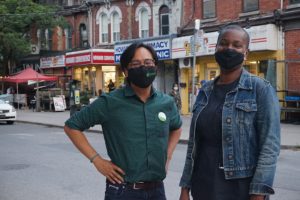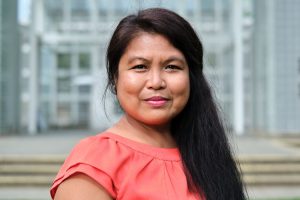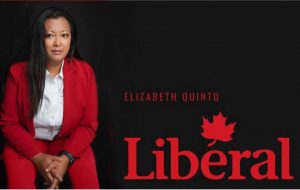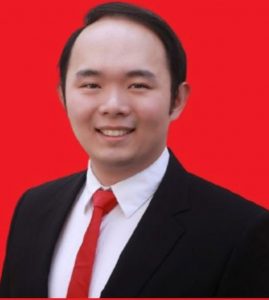Filipino-Canadians join race for MPs to Ottawa
Filipino-Canadians join race for MPs to Ottawa

Filipino-Canadian Phil De Luna, PhD, (left), Green Party candidate for Toronto-St Paul’s, go canvassing with party leader Annamie Paul (right) in her riding in Toronto Centre on September 3. The riding includes St. James Town where there are many Filipino-Canadians residing, working or doing business. Photo: Veronica Silva Cus
September 7, 2021
By Veronica Silva Cusi
The Philippine Reporter
Filipino Canadians are joining the race to Ottawa for the upcoming federal election on September 20. At least six of them have been researched by The Philippine Reporter, and a few have shared their position on some key issues facing the Filipino-Canadian community.
These six candidates, in alphabetical order, are:

Naden Abenes, NDP Party candidate for Vancouver Quadra, BC
1. Naden Abenes, NDP Party candidate for Vancouver Quadra, BC https://www.electnaden.ca/
2. Virginia Bremner, Liberal Party candidate for Vancouver-Kingsway, BC https://virginiabremner.liberal.ca/
3. Phil De Luna, Green Party candidate for Toronto-St. Paul’s, ON https://phildeluna.com/
4. Paul Ong, Liberal Party candidate for Winnipeg Centre, MB https://paulong.liberal.ca/
5. Elizabeth Quinto, Liberal Party candidate for Oxford, ON https://elizabethquinto.liberal.ca/
6. Rechie Valdez, Liberal Party candidate for Mississauga-Streetville, ON https://rechievaldez.liberal.ca/
The Philippine Reporter reached out to all these candidates to ask them about their campaign platforms, particularly those reaching out to the Filipino-Canadian community. Due to time constraints (aka deadline), not all were able to reply.

Elizabeth Quinto, Liberal candidate for Oxford,
Ontario
Most of the candidates have adopted the platforms of their respective political parties. Only a few have their own campaign platforms.
The Philippine Rreporter asked all candidates about their position on key issues which TPR thinks could be relevant to our readers. These issues are:
• Immigration — Migrant advocates, including some kababayans, have been calling for status for all for temporary foreign workers, many of whom are Filipinos, such as caregivers. Advocates want the Canadian government to grant status as soon as these workers land in Canada.
• Foreign credentials recognition — It is common knowledge among immigrant and refugee communities that education and training gained from outside of Canada are not readily recognized here in the country. Empirical studies, including policy studies, have revealed that Canada is losing billions of dollars in potential revenues by not recognizing foreign-acquired education, training and professional experience.
• Vaccine hesitation — A recent study led by researchers from St. Michael’s Hospital in Toronto indicates that there is vaccine hesitancy among racialized communities.
In either interview or email response to the TPR, candidates shared their positions on these issues.
De Luna is a young scientist who moved to Canada when he was five years old. He told TPR that his individual campaign platform – to include housing affordability, green jobs and climate change, and support for essential workers — is “personal” to him.

Paul Ong, Winnipeg Centre Liberal Candidate
For example, his father worked in the automotive industry in Windsor, Ontario, but was laid off during the collapse of the automotive industry in 2008. As an immigrant, he knows that new Canadians spend most in their paychecks for rent or mortgages, that is why he wants to address housing affordability. And, finally, he understands the plight of essential workers as his fiancé is a nurse.
“Many Filipino-Canadians work in healthcare, in the frontlines, … in fulfillment centres, in distribution centres in customer service, in agriculture. We can’t forget the lessons from this pandemic. What I’m advocating for is federal program for sick days, basic income, subsidized tuition for essential workers and tuition credits, and mental health supports for essential workers, many of whom are Filipinos,” De Luna told TPR in a phone interview.
On his position on immigration and foreign credentials recognition, De Luna can relate as his parents also experienced their foreign credentials from the Philippines not recognized. He said his dad was an engineer in the Philippines but ended up as a factory worker. His mom was a nutritionist in the Philippines but had to go back to school to get a certificate in accounting.
“When it comes to immigration, I want to streamline the process … [to] recognize the credentials of immigrants. [That is] come up with reskilling and retooling, and cost-effective educational strategies so that immigrants who come to this country can actually contribute their skills and their knowledge to the economy,” he explained.
“From my view, immigration should be about how can we ensure that we support and we integrate immigrants into this country in a way that allows them to provide for their family and the basic skills and the basic necessities,” he added.
On vaccines, De Luna said: “My personal opinion on vaccine is that we absolutely need vaccines in order to come out of this pandemic. I’m a scientist. I’m 100 per cent pro-vaccine.”
To reach out to those who hesitate, he urged governments to meet them where they are: by producing literature that are in their languages and to staff clinics with people from these racialized groups.
De Luna said he is also 100 per cent behind status for all, especially for essential workers, such as caregivers.
“These are some of the most vulnerable in the country hit by the pandemic. We have heard of temporary foreign workers stranded, living in conditions that facilitated COVID outbreaks. We’ve seen so many Filipino Canadians and other racialized TFWs who come to this country, and because of small bureaucratic form mistakes are forced to leave or deported despite the fact that they have given so much to this country with so much compassion and care. One hundred per cent, I’m in favour of status for all.”
De Luna holds a doctorate in Materials Science and Engineering from the University of Toronto. While pursuing a career in politics, he is currently on leave as director of the National Research Council Canada.
He said he was impressed by Green Party leader Annamie Paul’s push for increasing diversity and passion for breaking down the barriers for underrepresented groups that he was encouraged to join politics.
“When I told my mother I was going to run for office, she said “Anak, why are you doing this — leaving your career in the sciences.” … I’m doing this for the community,” De Luna said.
“Politics in Canada is about policies … about the laws and decisions that govern our society. So, I hope that me running as a Filipino-Canadian alongside Annamie Paul I hope to inspire more Filipinos to be politically engaged regardless of party. I think the time is now for Filipino-Canadians to make their voices heard in the political sphere. We are the fourth largest visible minority. … We need to have our voices heard, and I’m proud to do with the
Green Party and Annamie Paul,” he added.
Migrant worker advocate
Way in the west, another kababayan who has experienced for herself the struggles of immigrant workers, wants to represent our community.
Abenes is a hotel worker and labour advocate who helped organize the biggest hotel strike in Vancouver in 2019, which led to a ground-breaking negotiation on wage increase.
On her Facebook page, Abenes posted endorsements from labour groups, such as UNITE HERE Local 40, and members of the NDP and from kababayans, including community organizer Chris Sorio.
“She is a strong advocate for immigrant communities and working-class people,” said Sorio in his endorsement of Abenes.
Abenes told TPR via email reply that she supports status for all, particularly to address the backlog in processing immigration and refugee applications.
“The pandemic has shown us that Canada doesn’t do enough to protect marginalized peoples. Especially now, migrant students and workers desperately need permanent immigration status. If they are unable to access healthcare, or education and if refugees and undocumented people can’t speak out when they are being exploited at work, they become an institutionalized underclass. Immigration backlog for refugee families doubled since 2018. I support status-for-all as a way to address this serious backlog,” Abenes said in an email.
She also criticized Canada’s non-recognition of foreign credentials, calling it “a function of Canada’s imperialist legacy.”
“I am proud that the NDP resolved at its last convention to demand recognition of the foreign credentials of immigrants and migrants,” she added.
On vaccination, Abenes said she “support(s) mandatory vaccination because our communities are more vulnerable to this virus.”
“Immigrant workers are often part of the frontline communities that are first impacted by crises like a global pandemic. Canada can’t just flip the switch on its racist history. We need a proactive government approach to protecting racialized communities,” she said via email.
“We are in the fourth wave of the pandemic; it’s crucial that people get vaccinated. That said, it’s not always easy for those of us who are working multiple jobs or taking care of kids without help. We need to afford people more time off work to recover from their vaccine. We also need to address the crisis of economic inequality. We are living in a new gilded age with a pandemic ravaging those of us who don’t fit the mold,” she added.
The Liberal Party candidates
The Liberal Party has four candidates from the Filipino Canadian community (as far as TPR’s research). On their campaign websites and social media platforms, they have adopted the Liberal Party platform.
But one Liberal candidate, family law lawyer Elizabeth Quinto, shared her views on the issues TPR raised here.
Quinto said she supports more immigrants into Canada but is not clear on whether she supports the call for status for all. She reiterated support for the Liberal Party’s commitment to reduce processing times for family reunification that have been impacted by COVID-19 to under 12 months (see related story on party platforms).
On FCR, Quinto said she wants to bring to Canada’s attention that there are topnotch universities and academic institutions in the Philippines that “often are up to par with Canadian institutions.”
“If elected, I plan on bringing this to the table and making a priority for our government. Our community has been underrepresented for far too long, and it is time our concerns are heard. That way we can have more Filipinos working in good high paying jobs, continuing to contribute to the economy, and supporting their families,” she said in an email reply.
Like De Luna and Abenes, Quinto supports vaccination to keep communities safe. She supports the Liberals’ push for mandatory vaccination, particularly for those in the frontlines and doing essential.
“But I also do strongly believe in medical and religious exemptions. That being said, if anyone chooses not to get vaccinated, that is a choice we will respect, they must recognize that it does come at a cost due to restrictions for things like travel. I believe education is the key to helping marginalized communities understand their options and help them make an informed decision based on all of the information available to them,” she said.
Comments (0)